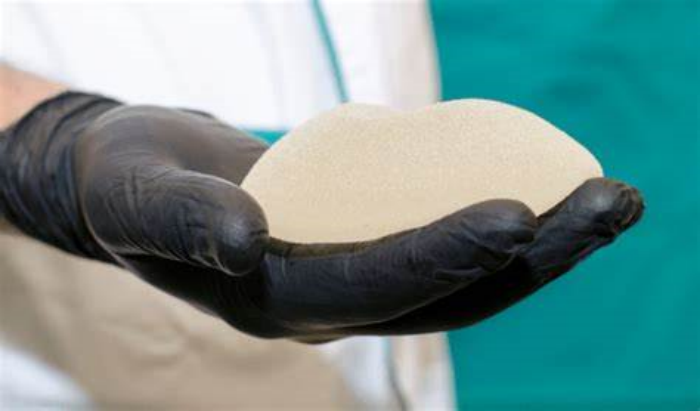A woman who developed a rare type of cancer linked to her breast implants has issued a warning about the potential risks that many women may unknowingly face. Susan Axelby, 68, is one of the few to have been affected by breast implant-associated anaplastic large-cell lymphoma (BIA-ALCL), a cancer of the immune system that can develop in the scar tissue surrounding breast implants.
Susan was recently awarded £57,000 in compensation by Allergan Limited, the company that manufactured her implants. This is believed to be one of the first such payouts related to Allergan breast implants in the UK. Her case has drawn attention to the potentially life-threatening risks that implants can carry, even years after surgery.
Susan’s Story: From Preventive Surgery to Cancer Diagnosis
Susan initially opted for breast implants after having her own breasts removed to reduce her risk of hereditary breast cancer. However, years after the procedure, she began to experience troubling symptoms. Swelling developed in one of her breasts, which felt unusually warm to the touch. When she sought medical attention, doctors drained 500 milliliters of fluid from the implant. However, the swelling soon returned, and the same amount of fluid was drained again within a month.
This cycle of swelling and drainage led to a referral to a specialist, where Susan was diagnosed with BIA-ALCL. BIA-ALCL is a rare cancer of the immune system, and while it is not a type of breast cancer, it can develop in the scar tissue around breast implants. The cancer is often associated with textured implants, which are known to have a higher incidence of the condition.
Susan expressed disbelief upon hearing her diagnosis. “I didn’t believe it,” she recalled. “I was in denial because I’d had my breasts off to stop me getting cancer, and now I’ve got cancer. I thought, ‘How can that be?'”
Treatment and Aftermath
The surgeon informed Susan that the affected implant and breast tissue needed to be removed, and that she would never be able to have implants again. In place of implants, the surgeon suggested using tissue from another part of her body for reconstruction, a procedure that Susan ultimately refused.
Today, Susan has no implants, breast tissue, or nipples. “There’s actually nothing,” she said. “There’s just a straight line all the way across the top of my body.” This dramatic change has had a profound impact on her confidence and mental health. She admits to experiencing ongoing struggles with anxiety and depression, which have only been exacerbated by her appearance post-surgery.
“I don’t like anyone to see me without any clothes on and that includes my husband, although he’s not bothered at all,” she added. “I have bad days.”
Legal Action and Compensation
Susan’s case against Allergan was settled in October 2023, with the company agreeing to pay her £57,000. However, Allergan did not admit liability in the settlement. Susan has stated that her lawsuit was not just for her own benefit but to raise awareness and potentially help other women who may face similar health risks.
“I’m thinking, not so much me – I’m nearly 70 – but there’s young girls, because they wanted breast augmentation, and they’re walking around like timebombs,” she said. “They’ve no idea what’s in their body now, and if it’s happened to me and a few other people, you know, they can be walking around like that.”
The Rare Risk of BIA-ALCL
Breast implant-associated anaplastic large-cell lymphoma (BIA-ALCL) is an extremely rare form of cancer. The current estimated incidence of BIA-ALCL in the UK is one case per 14,200 breast implants sold. Although the condition is rare, it has sparked significant concern, especially for women with textured implants.
The exact cause of BIA-ALCL is still being studied, but scientists believe it may be linked to the textured surface of some implants or a bacterial infection. In 2019, Allergan voluntarily recalled its Biocell textured breast implants and tissue expanders after they were found to be associated with an increased risk of BIA-ALCL. These implants are no longer manufactured.
The UK Medicines and Healthcare products Regulatory Agency (MHRA) has stated that there is no need for women who have breast implants but show no symptoms of BIA-ALCL to undergo removal or further checks. However, women who experience unusual signs or symptoms, such as swelling around their breast implants, are advised to seek medical attention immediately.
Ongoing Legal Action and Advocacy
While Susan Axelby’s case was settled, other women affected by BIA-ALCL are taking legal action against Allergan. A group of women in the Netherlands is seeking compensation on behalf of approximately 60,000 women who may have been affected by the implants. As the medical community continues to investigate the condition, advocacy groups are working to raise awareness and ensure that women are fully informed about the potential risks associated with breast implants.
Conclusion
Susan Axelby’s experience serves as a stark reminder of the potential dangers of breast implants, especially those with textured surfaces. Although BIA-ALCL is rare, the condition is serious and can have life-altering consequences. For women considering breast augmentation or already living with implants, it is important to stay informed about the risks and seek medical attention if any symptoms arise. Susan’s warning about the “timebombs” that some women may be carrying serves as a call to action for greater awareness and more research into the long-term health effects of breast implants.

